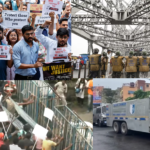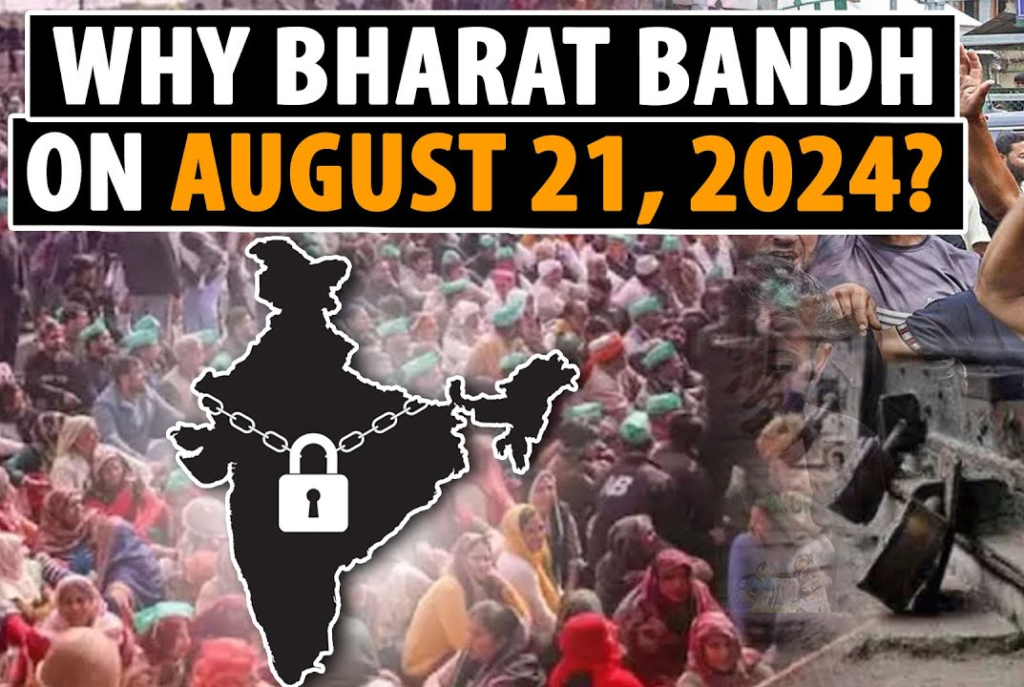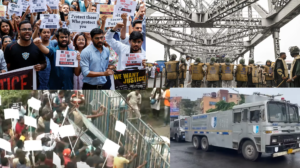The Bharat Bandh scheduled for August 21, 2024, has garnered significant attention across India. This nationwide strike, called by the Reservation Bachao Sangharsh Samiti, aims to protest the Supreme Court’s recent ruling on SC/ST reservations. The bandh has received widespread support from various social and political organizations, particularly in states like Rajasthan and Karnataka. This article provides an in-depth look at the reasons behind the bandh, its expected impact, and the preparations being made to handle the situation.
Background of the Bharat Bandh
The Supreme Court’s ruling, which allowed states to create sub-categories within the SC/ST groups, has sparked widespread debate and controversy. The court stated that “those who really need it should get priority in reservation,” a decision that many believe undermines the existing reservation system1. The primary objective of the Bharat Bandh is to challenge this decision and demand its reversal2.
Reasons for the Bandh
The Reservation Bachao Sangharsh Samiti, along with various SC/ST groups, has called for the bandh to draw attention to what they perceive as an unjust court decision. They argue that the ruling could lead to further marginalization of certain sub-groups within the SC/ST communities3. The bandh aims to highlight these concerns and push for a more equitable reservation system.

Support for the Bandh
The Bharat Bandh has received support from numerous social and political organizations, including the Bahujan Samaj Party (BSP). In Rajasthan, SC/ST groups have extended their support, and similar backing is expected in other states like Karnataka and Kerala4. The widespread support indicates the deep-rooted concerns within these communities regarding the Supreme Court’s ruling.
Preparations and Security Measures
In anticipation of the bandh, law enforcement authorities across various states have ramped up security measures. In Rajasthan, police have been asked to increase their presence in all districts to prevent any potential tension5. The state’s Director General of Police (DGP), UR Sahoo, has instructed Superintendents of Police (SPs) to ensure law and order during the bandh6.
In Western Uttar Pradesh, known for its sensitivity during such events, the police have been placed on high alert. Top police officials, district magistrates, and divisional commissioners have held meetings to prepare for the bandh and ensure public safety.
Impact on Daily Life
The Bharat Bandh is expected to disrupt daily life across India. Public transportation, private offices, and markets are likely to be affected. However, essential services such as hospitals, pharmacies, and emergency services will remain operational. Government offices, schools, and colleges are expected to function as usual, although there may be localized disruptions depending on the intensity of the protests.
Specific Impact in Key States
Rajasthan
Rajasthan is expected to be one of the epicenters of the Bharat Bandh. The state has a significant SC/ST population, and the Supreme Court’s ruling has been met with strong opposition here. The police have been instructed to hold meetings with groups calling for the bandh and market associations to facilitate better cooperation. The state’s administration is taking extensive steps to ensure that the bandh does not escalate into violence.
Karnataka
In Karnataka, the bandh is expected to receive substantial support from various social and political groups. The state’s SC/ST communities have expressed their dissatisfaction with the Supreme Court’s ruling, and protests are anticipated in major cities like Bengaluru and Mysuru. The state government has assured that essential services will remain unaffected, and security measures have been heightened to prevent any untoward incidents.
Kerala
Kerala, known for its active participation in social and political movements, is also expected to witness significant protests during the Bharat Bandh. The state’s SC/ST organizations have voiced their concerns over the Supreme Court’s decision, and demonstrations are likely in cities like Thiruvananthapuram and Kochi. The state police have been put on alert, and measures are being taken to ensure that the bandh remains peaceful.
Public Reactions and Opinions
The Bharat Bandh has elicited mixed reactions from the public. While many support the cause and believe that the Supreme Court’s ruling needs to be challenged, others are concerned about the disruption to daily life. Social media platforms have been abuzz with discussions, with hashtags like #BharatBandh and #ReservationRights trending.
Government Response
The central and state governments have been closely monitoring the situation. The Home Ministry has issued advisories to all states to ensure that law and order are maintained during the bandh. The government has also urged the public to remain calm and cooperate with the authorities to ensure a peaceful protest.
Historical Context of Bharat Bandhs
Bharat Bandhs have been a common form of protest in India, often used to draw attention to significant social, political, or economic issues. These nationwide strikes have a long history, dating back to the pre-independence era when they were used as a tool against British colonial rule. In recent years, Bharat Bandhs have been called for various reasons, including economic policies, social justice issues, and political decisions.
Conclusion
The Bharat Bandh on August 21, 2024, is a pivotal event that highlights the growing unrest within the SC/ST communities in response to the recent Supreme Court ruling on reservations. The decision to allow sub-categorization within SC/ST groups, which prioritizes certain sub-groups based on their level of disadvantage, has been perceived as a potential threat to the unity and inclusivity of the reservation system. For many, this move undermines the very foundation of affirmative action policies in India, designed to uplift historically marginalized communities. The Bharat Bandh is a unified call for the reversal of this ruling, emphasizing the need for a fair and equitable reservation system that benefits all.
The widespread support for the bandh, from both social and political organizations, underscores the deep-rooted concerns among SC/ST groups. Organizations like the Reservation Bachao Sangharsh Samiti, which called for the bandh, have voiced their fears that the court’s ruling could lead to internal divisions within these communities. The growing unease has been most visible in states like Rajasthan, Karnataka, and Kerala, where a significant portion of the population identifies with these marginalized groups. In these states, the support for the Bharat Bandh is especially strong, with protests expected to disrupt daily life significantly.
The backing of prominent political parties, such as the Bahujan Samaj Party (BSP), further reflects the importance of the issue. BSP leaders have been vocal about their opposition to the ruling, seeing it as an attempt to erode the rights of SC/ST communities. Social media platforms have also seen a surge in discussions about the bandh, with hashtags like #BharatBandh and #ReservationRights trending, which indicates that this issue resonates deeply with many sections of the population.
While the bandh is expected to bring attention to the grievances of SC/ST communities, it is also likely to cause widespread disruption. Public transportation, businesses, and schools in many states may be affected, with certain regions, particularly in Rajasthan and Karnataka, expected to see significant slowdowns. However, essential services like hospitals, pharmacies, and emergency services will remain operational to ensure public safety.
Security measures across India have been ramped up in anticipation of the Bharat Bandh. Law enforcement authorities in key states have been instructed to increase their presence in public spaces and ensure that the protests remain peaceful. Meetings between top police officials, district magistrates, and other authorities have been held to coordinate efforts and prevent any escalation of violence. States like Rajasthan and Karnataka have implemented strict security protocols, with local administrations working closely with protest organizers to maintain order and avoid clashes between law enforcement and demonstrators.
The government, on its part, has urged the public to remain calm and cooperate with law enforcement during the bandh. The Home Ministry has issued advisories to all states, emphasizing the importance of maintaining law and order while allowing peaceful protests. While the central government has refrained from making any immediate decisions about the Supreme Court ruling, it is closely monitoring the situation to ensure that public safety is not compromised.
In conclusion, the Bharat Bandh of August 21, 2024, serves as a critical juncture in India’s ongoing conversation about social justice and affirmative action. It highlights the concerns of SC/ST communities, who feel that the recent Supreme Court ruling may further marginalize already vulnerable sub-groups. As the nation braces for the bandh, it is crucial that all stakeholders—government, law enforcement, and protesters—work together to ensure that the protest remains peaceful, and that the concerns of marginalized communities are addressed in a manner that preserves the unity and integrity of India’s reservation system.
References
1: Business Standard 2: MSN 3: Economic Times 4: OneIndia 5: Times of India 6: Livemint : Hindustan Times : MSN : Business Standard : Economic Times : Times of India : OneIndia : Livemint : Hindustan Times : MSN : [Business Standard](https://www.business











More Stories
Dynamic Duo 2024: A Tale of Two Stars: Aditi Rao Hydari and Siddharth
Kolkata Protests 2024: A Detailed Analysis of the RG Kar Medical College Incident and the Nabanna Abhijan Movement
NEET PG 2024 Results Released: Celebrating Success in Medical Education